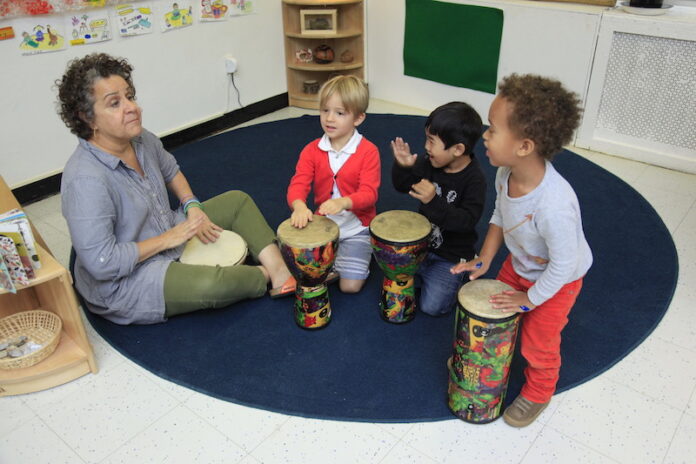Where would early childhood be without music?!? We rely on it to welcome children to the rug, signal transitions, help preschoolers wait out a delay, and reinforce basics such as rhyming and counting. It’s safe to say that music brightens classroom dynamics.
Singing together deepens children’s sense of community and introduces melodies, language, and rhythms from different cultures. Francis W. Parker School Music Department describes it as follows: “Music is a vehicle for students to express themselves in ways no other communication can achieve. We (Francis W. Parker School) strive to help students discover their own melody, create harmony with others, and experience the heartbeat of our shared humanity.”
RESEARCH: And now there’s more. Research is showing us how music helps young children build powerful thought networks that fortify their learning in areas as varied as language processing, visual perception, memory, mathematics, and, of course, creative expression. “Music molds the mind,” writes Dr. Susan Barry, professor of neurobiology at Mount Holyoke College, referring to early childhood when children are most receptive to music’s benefits. “Making music actively engages the brain’s synapses. As young children participate in music-based activities, their muscles, senses, and intellect are engaged simultaneously; they are exercising their brains in ways they rarely do. Long-term musical training actually re-organizes the brain.”
Here are some recent findings:
Executive Functioning: Preschoolers’ ability to organize new thoughts, ideas, and information is referred to as executive functioning. We spot it in children with a clear sense of purpose, who tackle a puzzle, build with blocks, or dress themselves efficiently. Their thinking is flexible; if one idea doesn’t work, an alternate is right behind it. “Since Executive Functioning is a strong predictor of academic achievement, even more than IQ, we think our findings have strong educational implications,” said Dr. Nadine Gaab of Stanford University. “
Literacy and Language Processing: Researchers Nadine Gaab and Paula Tallal have also found that musical training improves the way children’s brains process the spoken word. This improved auditory processing becomes an asset to children learning to read, and is especially helpful to children with dyslexia and other reading challenges because it helps them to hear the words as they decode.
Memory: Children who sing or play an instrument are consistently organizing, adjusting, and sequencing new material before committing it to memory, habits they then apply to diverse learning situations. In his 2014 book, Why Music Education Actually Matters, Blake Madden says, “Young children who take music lessons show different brain development and improved memory over the course of a year, compared to children who do not receive musical training. It is very interesting that the children taking music lessons improved more over the year on general memory skills that are correlated with non-musical abilities such as literacy, verbal memory, visuospatial processing, mathematics, and IQ than did the children not taking lessons.”
Analysis:
Music is another artistic medium that has proven to be very beneficial to the success of young students. I found the research findings about executive functioning, memory retention, and literacy and language processing to be very insightful and telling of how helpful music can be in the classroom. Taking these findings and applying them to the virtual learning environment would be an interesting design challenge. A lot of what students struggle with in online learning derives from a lack of focus. How can the benefits of music be utilized to improve the experience of at-home education?




